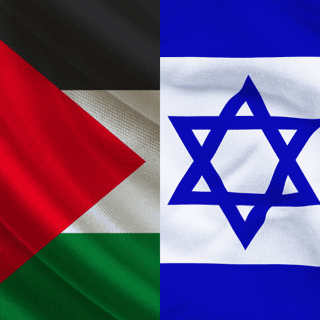While Gaza is being subjected to collateral damage by Israeli airstrikes and the West Bank by raids since the Hamas terror attack on Oct. 7, it is vital to listen to Palestinians address their suffering alongside Israelis in an unbiased environment. On Nov. 16, Shepherdstown’s Rotary provided that environment.
The community forum on the Palestinian-Israeli conflict, which was hosted on Shepherd University’s campus, should be a precedent to future discussions on the conflict.
Both Palestinian and Israeli panelists explained how the Hamas attack did not occur out of a vacuum.
Rather, it was a reaction to Israel’s relentless mistreatment of Palestinians in both Occupied Palestinian Territories, the Gaza Strip and the West Bank.
“It’s not random that there are people in Gaza who are unhappy with what happens in Israel [Israeli policies], and, while [I am] not supporting Hamas in any way whatsoever, but the more desperate you make people, the more they support whoever is [in charge] there,” Founding Director of ILLI Initiatives Dr. Adina Friedman, a representative of the Israeli side of the panel said.
The Palestinian voice provided a sense of frustration to that context.
“Gaza has been under siege for 17 years. Every drop of water, every bit of electricity, every bit of food that enters into Gaza is calculated by the Israeli authorities… The legal advisor to the Prime Minister said that we will put Gaza on a diet so that they will barely not starve,” founding member of the Palestinian Christian Alliance for Peace Phillip Farah said.
Farah, born in Jerusalem in 1948, comes from a Christian-Orthodox Palestinian family.
At the forum, he shared a disturbing story of how his 84-year-old cousin who was seeking safety in the All Saints Church in Gaza was killed by an Israeli sniper on Oct. 19.
“What good is it for her [second cousin] to be shot as she was walking out of the All Saints Church… to see what happened to her house and to take a shower, if there was any water,” Farah said. “She was shot immediately by a sniper and no one could rescue her, so she bled all night, and she died this horrible, terrifying death, an 84-year-old woman.”
Unfortunately, his cousin’s story is one of many Palestinian stories told since the founding of the State of Israel in 1948.
Palestinians are imprisoned without trial, abused by Israeli soldiers at checkpoints, beaten at holy sites, or killed by Israeli soldiers such as Farah’s cousin.
The community forum aimed at allowing attendees to listen to one of these stories uninterrupted. It gave the audience a humanized account of what happens on the ground as Israel says it retaliates against Hamas.
The ongoing war in Gaza suggests that those who receive the brunt of Israel’s retaliation are mostly civilians, however, not Palestinian militants.
According to the Hamas-run Gaza Health Ministry, over 15,000 Palestinians have been killed since Oct. 7. Over half of that number are women and children.
60 journalists, over 100 UN staffers, and over 200 medical staff in Gaza have also been killed alongside Gaza’s civilians.
The situation in Gaza is unprecedented, but the situation in Israel is also painful, and the Israeli voice was also heard at the forum.
Israelis are still suffering from the death of their loved ones. Many are anxious as they wait for their family members taken hostage to be freed.
“The violence is ongoing. For Israelis, it’s the worst they’ve ever experienced. They’re not in a good listening place right now. Israelis are still going to funerals, still waiting for hostages, half of whom may not be alive,” Friedman said.
At the same time, she explained that many Israelis do not know what Palestinians go through. It may have played a role in Palestinian dehumanization in Israel, and a surprised reaction to the attack on Oct. 7.
“As an Israeli who has worked with Palestinians and is attuned to what is going on in the West Bank and in Gaza; there is violence on a daily basis. A lot of Israelis don’t see that. It’s a fault of many things: psychological barriers, politics, media, school.,” she said. “But many of them don’t understand the gravity of the situation on the Palestinian side. And then suddenly, [they ask] ‘where did this [Oct. 7 attack] come from?’ This isn’t a good excuse, but I’m just saying, that is the case.”
In order to see lasting peace between Palestinians and Israelis, these are the types of discussions that must be held. The suffering has become unbearable for Palestinians, and the mourning of Israeli families who have lost their loved ones must cease.
While disagreements are bound to occur, as it may be difficult to humanize the suffering of whoever is on the other side of a conflict, we cannot give up on peace.
Now, fighting rages once again in Gaza and the West Bank after a ceasefire was in place for seven days. The fighting will have no end in sight if there is no mutual understanding between both sides.
The Shepherdstown Rotary’s community forum proved that this required mutual understanding is possible. It provided an environment where Palestinians and Israelis can freely express their points of view while humanizing those on the other side at the same time.
That’s why every community forum that discusses the Palestinian-Israeli conflict in the future should use the Rotary’s community forum as its precedent.

Leave a Reply